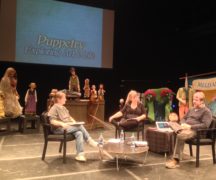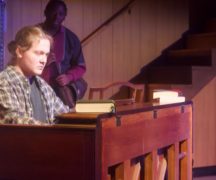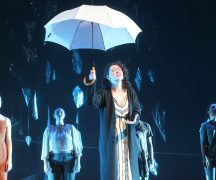By DAVID DUPONT
BG Independent News
Faced with a world where being face to face with other people poses a danger to themselves and others, the university artists, whose work revolves around the contact with their colleagues and audiences, have persisted.
ArtsX, which streamed in full Saturday and remains online through May, is a celebration of that persistence. The quantity, and variety, and quality demonstrated that the visual artists, dancers, musicians, writers, actors and theatrical technicians put this time of circumscribed activity to good use.
Nothing made that more evident than the climax of ArtsX, the premiere of the Department of Theatre and Film’s production of “The Theory of Relativity” by composer and lyricist Neil Bartram with book by Brian Hill.
In his production notes director and choreographer Michael Ellison explained how the show came together with vital assistance from musical director Jared Dorotiak, stage manager Kate Tayler, sound technician Jason Walton, and film director Campbell Holben.
The pandemic restrictions meant the whole 16-member cast, which includes one understudy (D’Juliana Calzada), could be on stage at any one time. If all 15 were needed for a chorus number, eight were on stage in the Donnell Theatre and the rest appeared on screens in segments filmed in the Eva Marie Saint Theatre. All the performances were lip-synched with each performer individually recording their solo and ensemble vocal parts. The dubbing was seamless.
Ellison and his crew didn’t just accommodate themselves to the limits the pandemic placed on them, they made it part of the show, which is a musical about making connections.
“The Theory of Relativity” itself is not quite what it appears at first. I took it to be a song revue, with a free floating theme that links songs together, but plotless – think “Songs for a New World” or “Fugitive Songs.”
And the creators play with this. They open with a dizzying blast of formulas, equations, and truisms about life in “Person A,” and then deliver the theme-setting choral number “Relativity.” The company proclaims: “We’re all on this marble hurtling through space, our orbits and paths are unique.” Yet they believe those paths will intersect.
The musical enfolds with a series of vignettes that seem unrelated, but are indeed connected in many odd and wonderful ways. Michael Cuschieri portrays a young man asking his girlfriend’s father for permission to marry her even though he is allergic to cats, and she has four. It’s a droll bit of work with Cuschieri making us believe Dr. O’Hara is sitting across from him when he’s really addressing the amorphous audience beyond the cameras. Yet he and the rest of the cast achieve a sense of intimacy that draws us in.
That’s powerfully the case in “Me and Ricky.” Maria Fallouh gives a dramatic rendition of a girl’s introduction to heartbreak, and the scars it leaves. Most of the song is done with three back-up singers – Alexis Roberts, Molly Marquette, and Macie Haggerty – doing the doo-wops on the Donnell stage while Fallouh on a screen belts out her story about her passion for Ricky. The music evokes those old rock ‘n’ roll songs about the girl loving the “wrong” boy, except with a sharp dose of consequences. The camera cuts in for a close up as the tale resolves in bitterness.
This is the most riveting number, and the saddest, leavened by Bartram’s clever way with a lyric.
That the show was written for college age or slightly older cast members adds to the sense of immediacy. These concerns about love and identity strike close to home. In “Footprint,” Nick Conner sings most directly of a student’s experience leaving home for campus. He knows that whatever struggles he has adjusting to college life he always has a place to return where his parents, sister, dog and familiar surroundings await. But he finds even as he grows and changes, his family doesn’t remain static. Each time he goes back something has changed.
In “Apples and Oranges,” Nick Adams portrays a character coming to grip with his sexual identity, all played out through his dislike of apples. He finds a partner in Dakota Nelson’s character who shares his preference in fruit.
We’ve already met Nelson’s character in the song “Great Expectations” where he sings about the burden of coming from a long line of tradesmen and the expectation that he’ll carry on. This interweaving of characters’ lives is understated.
Also, in “Great Expectations,” McKinley Witt sings about the expectations that come from being the daughter of an immigrant family and their high hopes for her. Later we see her character on a collision course with Ben Logue on a city sidewalk. She’s intent on ignoring him and asserting that fact by yielding no ground as she applies lipstick on the move. He’s fascinated by her and would not mind exchanging a greeting. It ends badly.
In the power ballad “Promise Me This,” Anne Koziara speaks of the expectation to make the most out of life as her single mother’s miracle. That spirit lifts her even after her mother dies.
“Julie’s Song,” performed by Darla Arnett in which she breaks the news that her four “friends” will have to make room in their lives for her “pussy cat” fiancé, serves as a bookend for that early monologue by Cuschieri.
Two characters make recurring appearances. The germ phobic character played by Macie Haggerty is distraught because her boyfriend baked her a cake “with his hands” and she doesn’t have a technique for dealing with that. Her phobia coincidentally echoes current pandemic concerns. So many of us are by necessity a little bit like her. She is the only character who appears with a mask, albeit usually hanging off one ear.
Blaine Hudak sings “Pi” about how numbers make sense and romance does not as he prepares for a blind date. But he slowly realizes that Pi with its string of numbers stretching into infinity makes no more sense.
The script pulls all this together with an antic comic monologue delivered with brio by Katie Trumbull. She fusses to a nail technician about going on a blind date with a physics major. She’s even tried to learn something about the theory of relativity to prime their conversation … if she actually decides to go. She’s ready to talk about “the constant nature of the speed of life.” In that verbal slip hangs the entire show. The only thing left to do is bring the chorus, including Andrea “Nikki” Stitak , on stage and on screen to sing the waltz time ballad “I’m Nothing Without You.”
And what would we be without the arts? This musical and all the other offerings served up by ArtsX and earlier this semester remind us of how much all this means to us, and how satisfying a good show is even in pandemic-friendly form.
***
“The Theory of Relativity” is available for streaming for a small charge through May 21.





